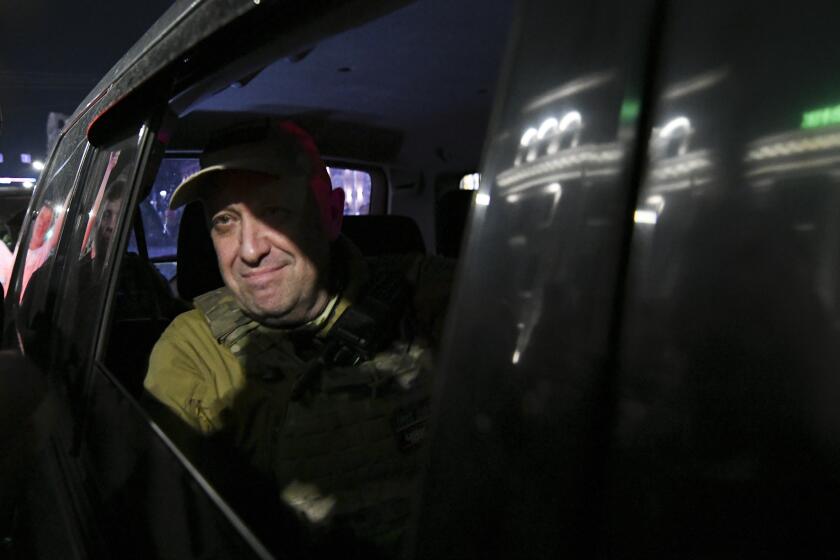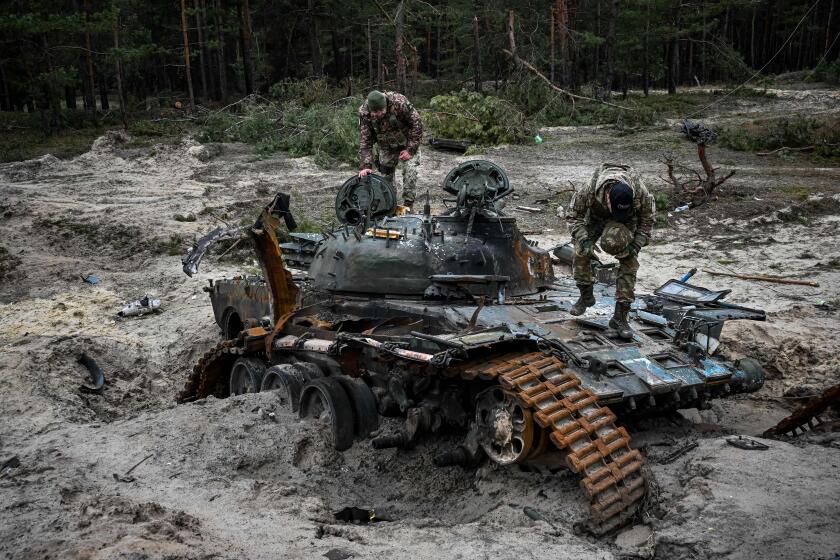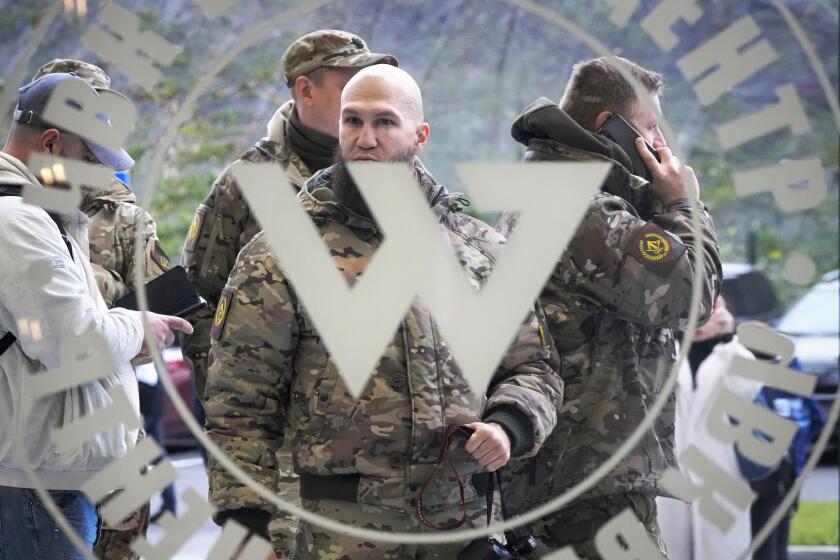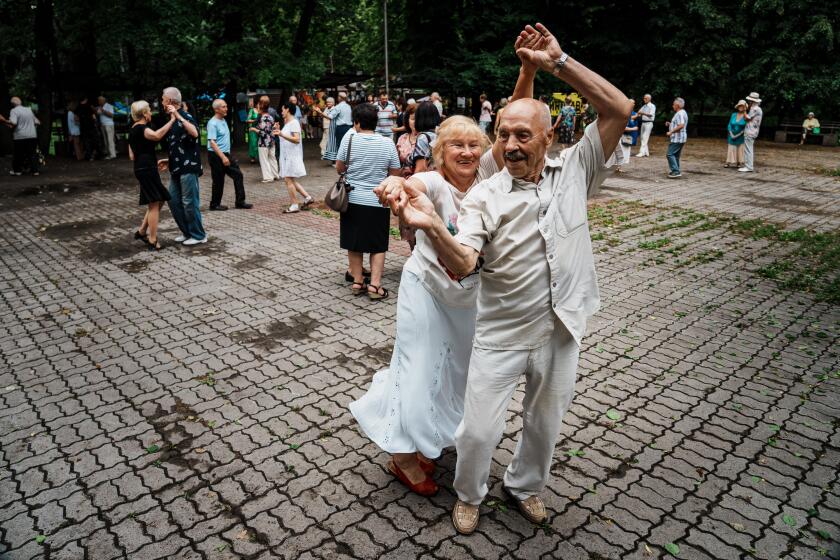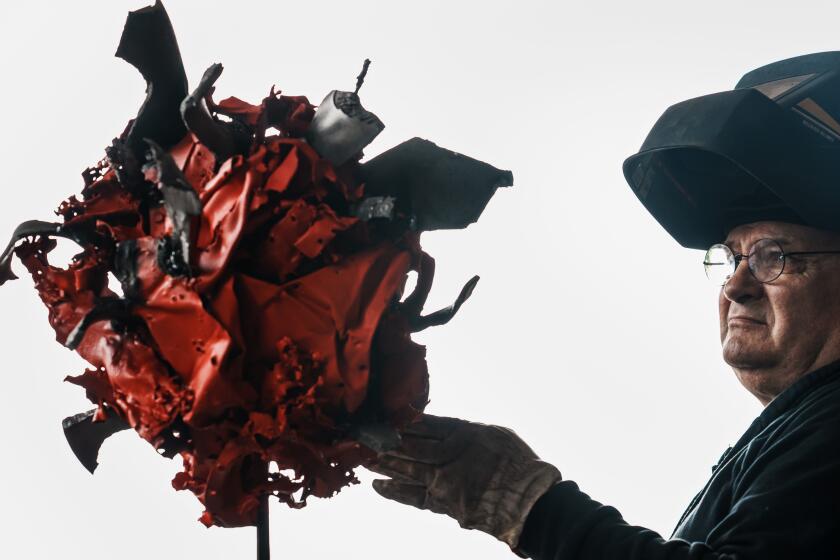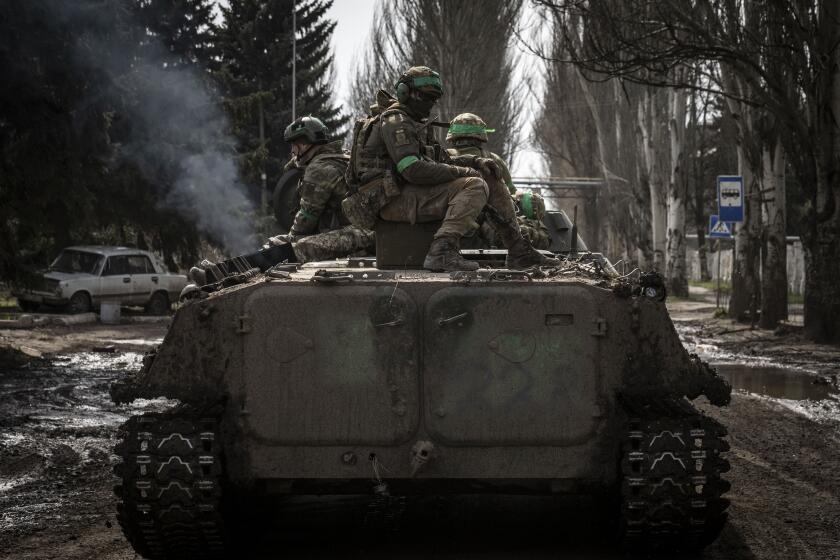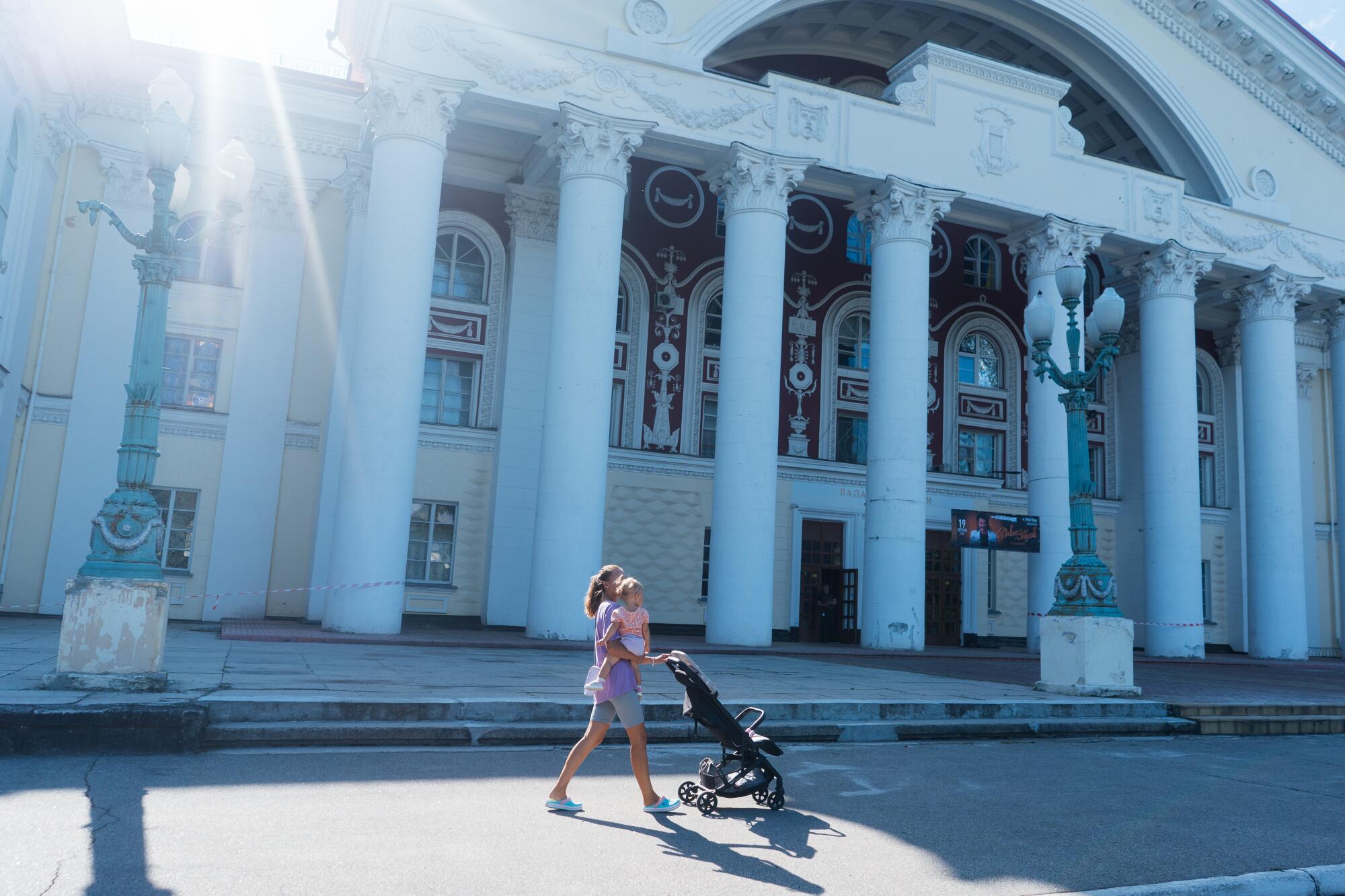
- Share via
ZHOVTI VODY, Ukraine — This city of 43,000 in central Ukraine owes its modern existence to the Soviets, who discovered uranium ore here in 1951.
The mines they developed were so critical to their nuclear weapons program that nonresidents needed special permission to enter the city. To keep the residents happy, the Kremlin turned Zhovti Vody into a model Soviet city, with tree-lined boulevards, schools, shops, apartments and a performance hall so grand that it rivaled the opera house in Moscow.
Central to the uranium extraction effort was a mining specialist named Yukhym Prigozhin, who was sent from Russia and became something of a local hero. After the Soviet Union collapsed, he stayed.
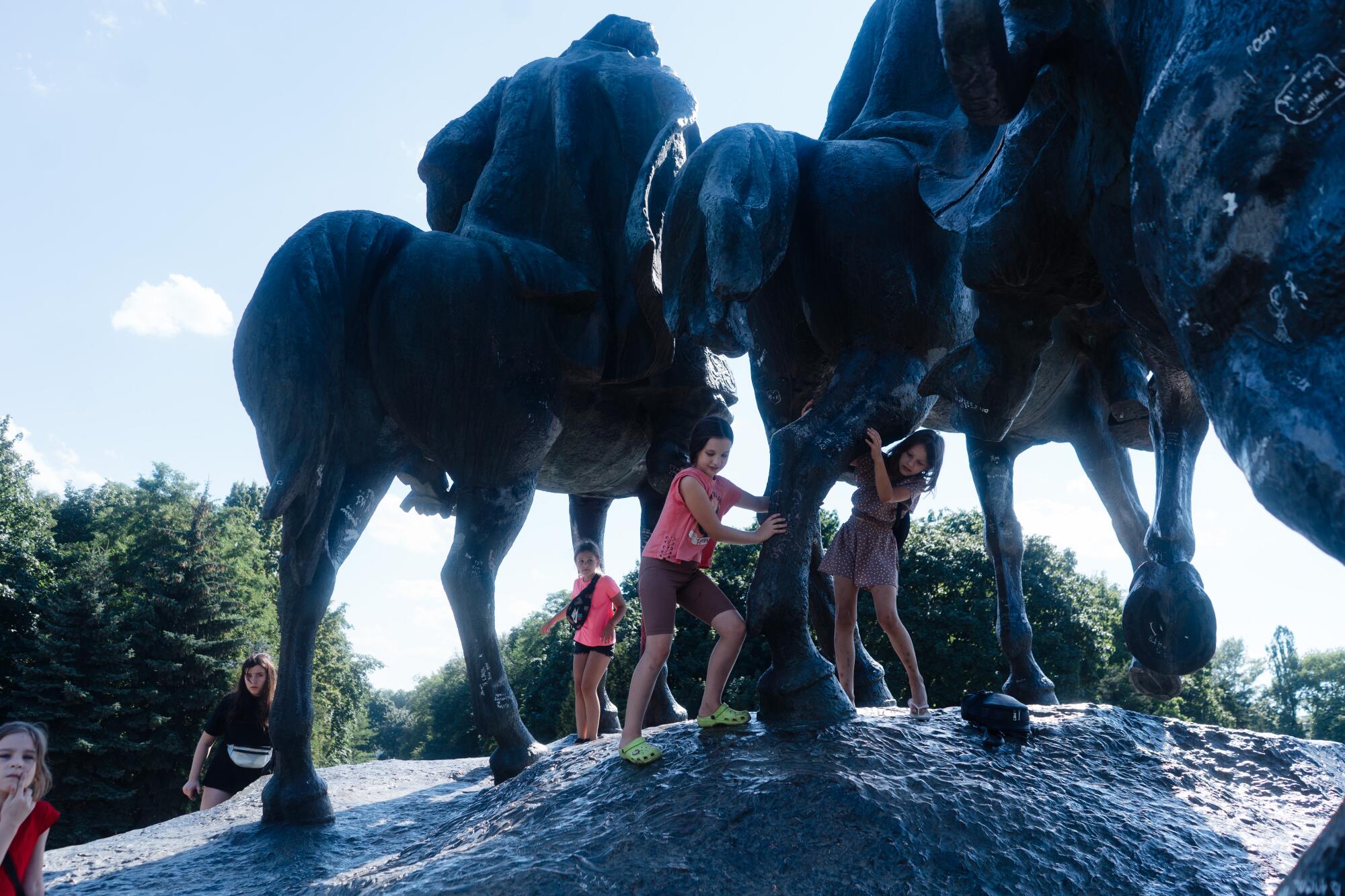
When he died in 1999 at age 85, the city renamed its history museum for him and adorned the front of the building with a plaque bearing his profile and the inscription “honorary citizen.”
Now some are questioning that decision.
Prigozhin, it turns out, is the great-uncle of Yevgeny Prigozhin, the Russian boss of the Wagner paramilitary group, whose mercenaries have played a crucial role in the Russian invasion of Ukraine and stand accused of brutal war crimes — and who Russian authorities said died Wednesday in a plane crash.
Wagner Group chief Yevgeny Prigozhin was among those killed aboard a flight from Moscow to St. Petersburg that crashed, Russia’s aviation agency says.
The controversy over the museum began in June when the warlord told a pro-Kremlin blogger that he had fond childhood memories of Zhovti Vody. In a clip from the interview posted to a city Facebook group, he recounted visiting his grandfather’s brother there and joked that he ate apples that had grown as large as basketballs on account of radiation from the mines.
The interview unleashed a thread of anger.
“If this is true, we need to prepare for the demolition of the Prigozhin museum,” wrote one commenter.
Another suggested this line be added to his plaque: “Unfortunately, his brother’s grandson is a racist scumbag who heads the Wagner Communist Party, guilty of murders of Ukrainian citizens, destruction of Ukrainian cities and villages.”
Disputes over the naming of institutions have erupted across the United States in recent years as the country grapples with its history of slavery and racism.
The case of the Ukrainian museum comes with a twist: Can a family name be enough to marginalize somebody who is otherwise beloved?
The town’s mayor, Dmytro Khanis, says no.
“Everyone understands that the man we know, who was named an honorary citizen of this city and whose name is on the museum, is our star, our pride,” he said. “The other Prigozhin is not our business.”
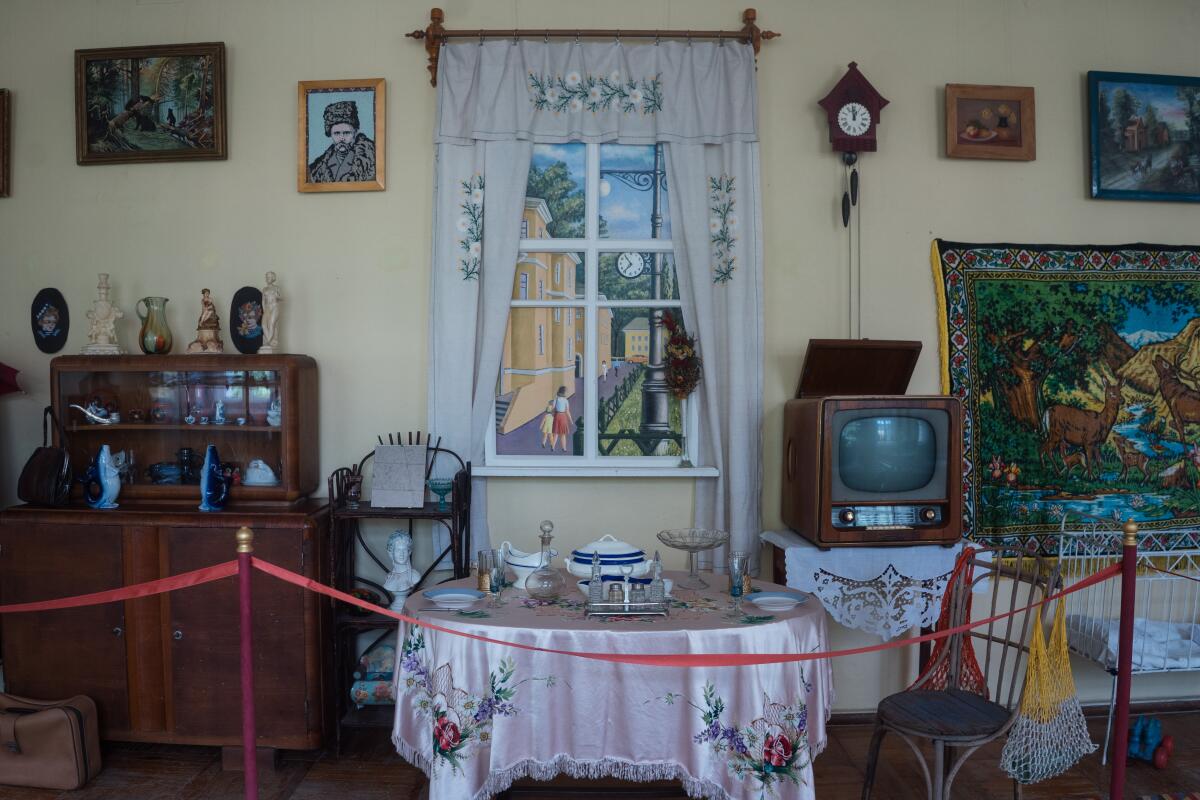
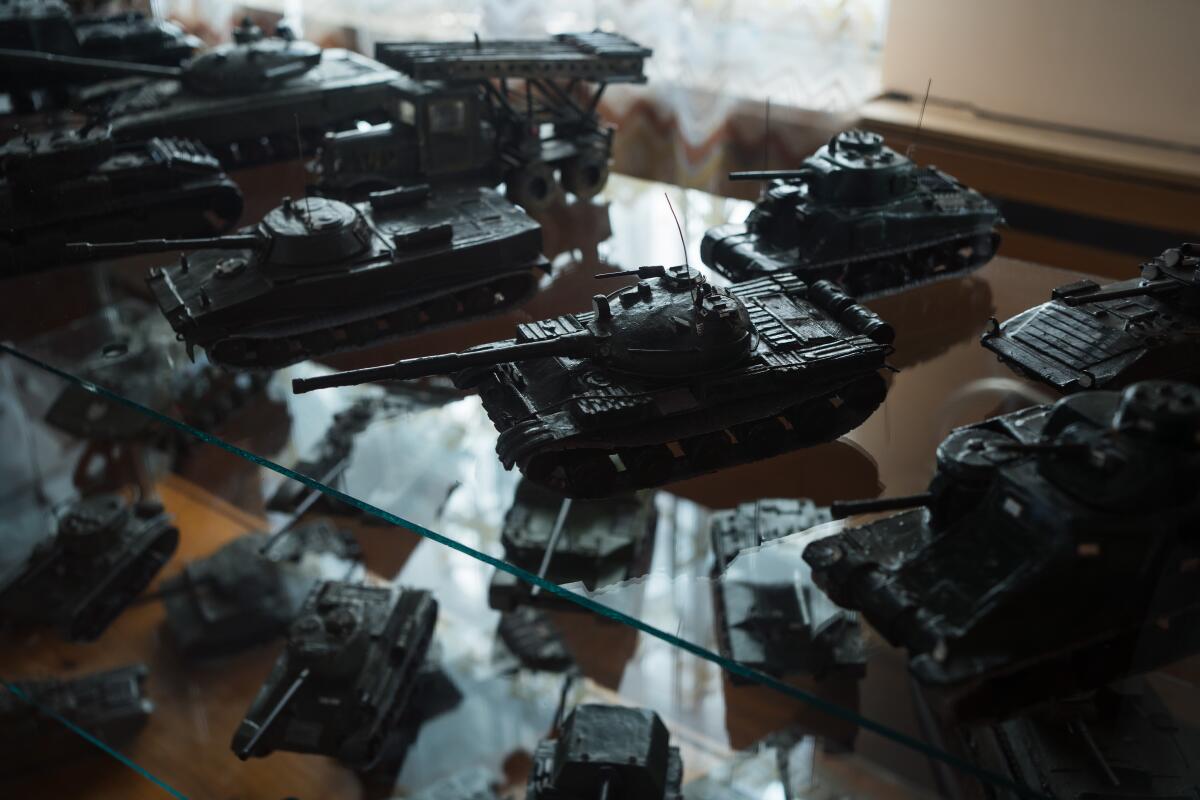
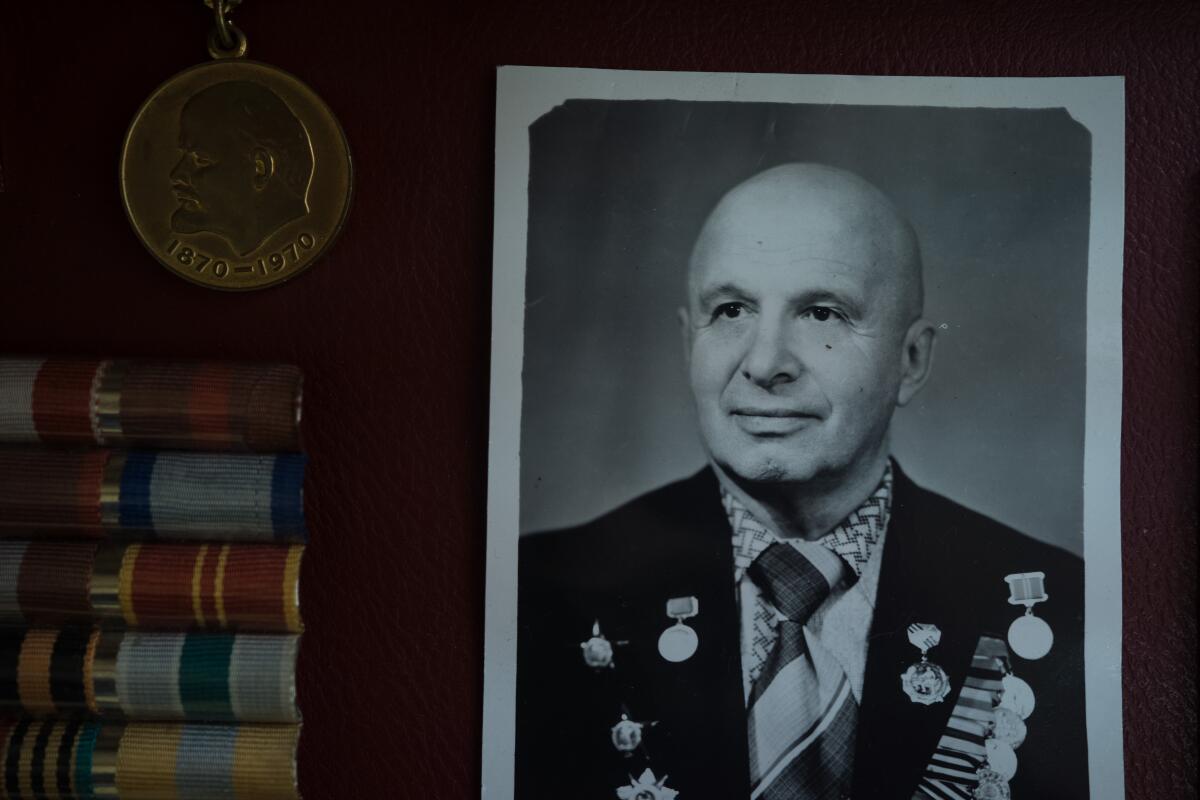
Yukhym Prigozhyn’s portrait and medals at the museum in Zhovti Vody on Aug. 3, 2023. (Anastasia Vlasova / For The Times)
The museum’s director, Olena Kobzar, said she was dismayed by attempts to tarnish the town hero.
“Those who think we should change the name are those who did not know our Prigozhin and are simply naive,” she said.
Yukhym Prigozhin, a World War II veteran, was in his late 30s when he arrived here. At the time, Zhovti Vody — which in Ukrainian means “yellow water,” a nod to the ore-induced tint of the river — was a tiny settlement best known as the site of a pivotal 1648 battle in which the Ukrainian Cossacks defeated the Polish-Lithuanian army.
Prigozhin quickly earned a reputation as the steadfast and decisive director of the Central Research Laboratory of Automation, which developed the machinery used in the mines.
When he retired in 1976, he turned his three-room apartment into a creative space that he called “Highlights” and opened it to young poets, artists or anybody who wanted to talk about history, life or — after 1991 — the demise of the former Soviet Union.
The Ukrainian military’s surrender hotline, dubbed ‘I Want to Live,’ is enticing some Russian soldiers to quit the battlefield as the war drags on.
He dedicated himself to writing books of children’s poetry — and in 1995 published a book on the 100-year history of Zhovti Vody.
Shortly after the book’s release, he told a television reporter that he wrote it because he was concerned that in the chaos after the collapse of the Soviet Union, the small city with a big past had lost its unity.
He said he wanted to show young people “what talented and nice people live in this great city that was closed for 40 years.”
One of Prigozhin’s friends was a geologist named Viktor Yakovlev, who started at the uranium mines shortly after Prigozhin had retired, but came to his apartment studio to learn how to repair watches.
Prigozhin and his wife, Valentina, had no children, but on several occasions he mentioned to Yakovlev that he had a brother in Russia. He described that side of the family — including a great nephew named Yevgeny — as hooligans and bullies.
Yakovlev, 70, said that if his friend were alive today to see what his great nephew had been up to in Ukraine, “it would have driven him insane.”
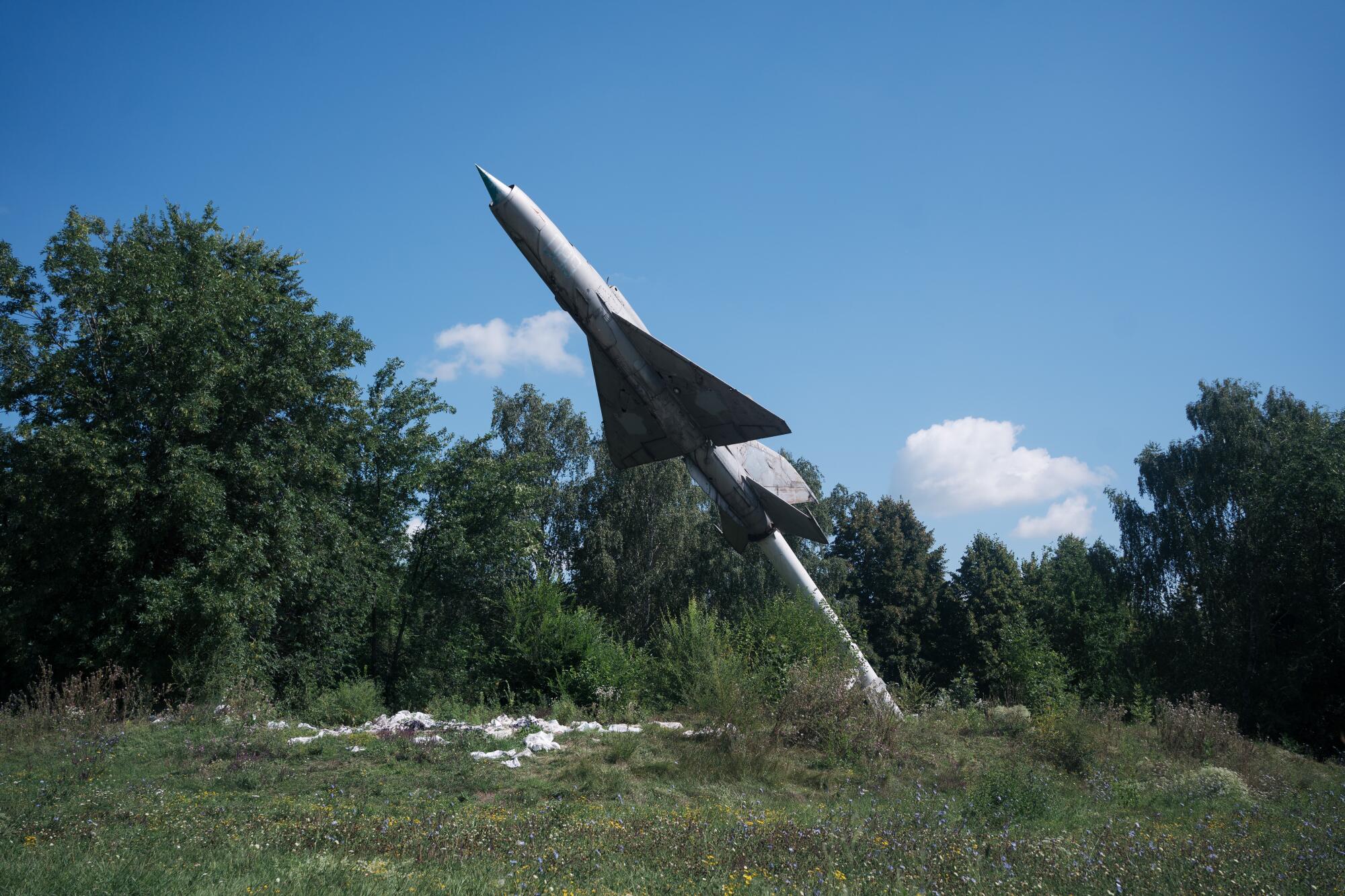
Yevgeny Prigozhin, 62, was born and raised in St. Petersburg and had a troubled youth. He spent his early 20s in Soviet prisons for robbery and assault but eventually started a hot dog stand business that grew into restaurants, supermarkets and a catering service.
A frequent diner at his high-end restaurants was Russian President Vladimir Putin. The two men struck up a friendship that helped Prigozhin score lucrative government contracts.
In 2013, his empire expanded to include the infamous Internet Research Agency, which stands accused of playing a key role in helping Russia interfere in the 2016 U.S. presidential election.
The Wagner Group, which he secretly founded in 2014, has been accused of human rights abuses nearly everywhere its mercenaries operate, including Syria, Libya, the Central African Republic, Sudan and Mali — and most recently Ukraine. The group, which relies largely on Russian prisoners, helped Russia capture several Ukrainian cities in the war.
Russian private military contractor Wagner is busy boosting its brand as its fighters try to subdue Ukraine, trading secrecy for war propaganda movies.
How do citizens of Kyiv cope with the sleep deprivation and stress from Russia’s war on Ukraine? Some push it down, some try yoga or dancing.
But in June, Prigozhin accused the Kremlin of keeping essential ammunition and equipment from his troops and launched a coup that quickly failed.
On a Telegram channel associated with the Wagner Group, he appeared in video posted Monday claiming to be in Africa and pledging to “make Russia even greater on all continents” and Africa “more free.”
Then on Wednesday, Russia’s aviation authority reported that Prigozhin was among the passengers on a private jet that crashed north of Moscow, killing all 10 people on board.
In Zhovti Vody, the museum is still officially called the City Historical Museum Named for Yukhym Illich Prigozhin. The City Council has yet to put the naming debate on its agenda.
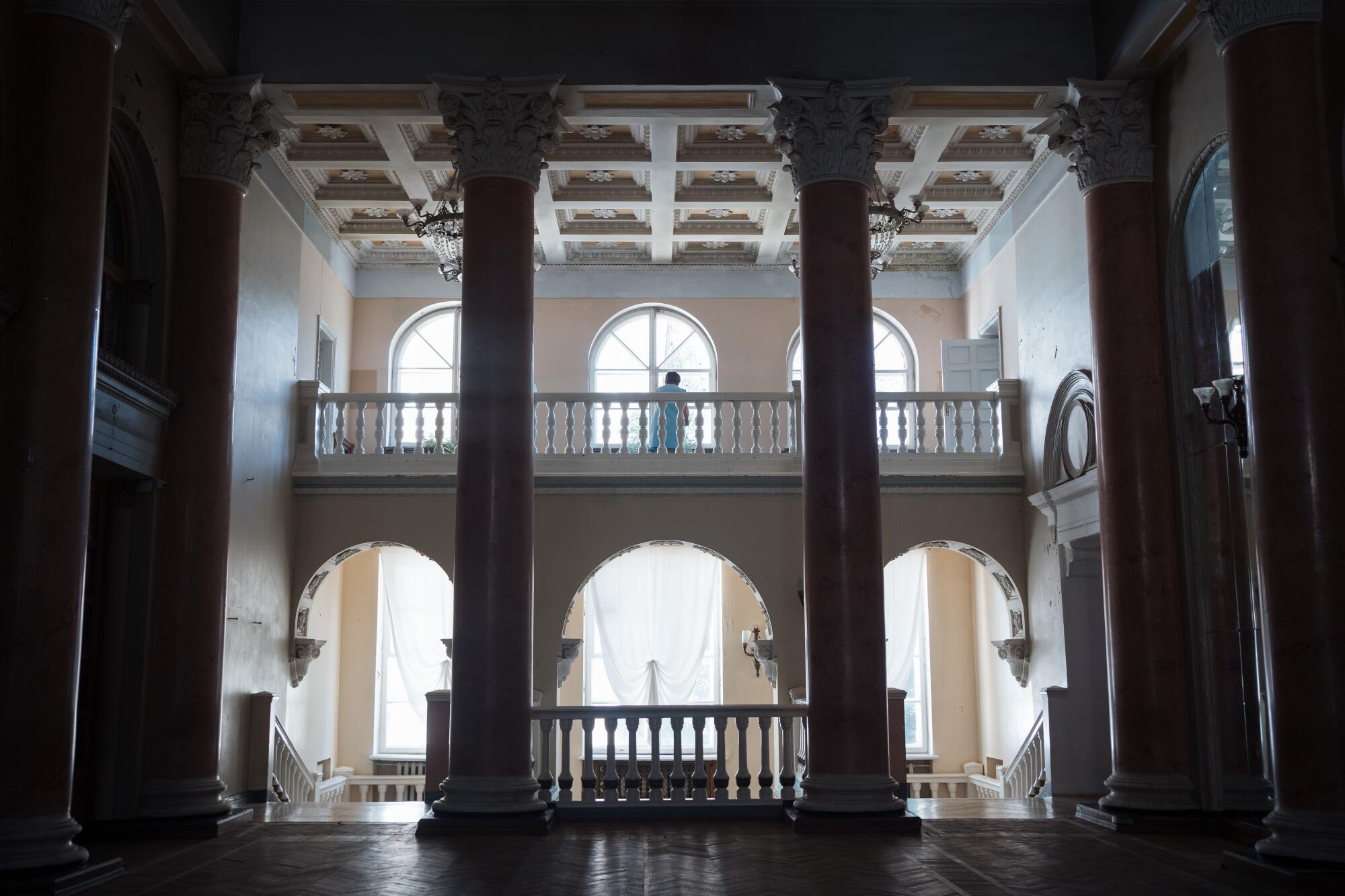
But the broader issue isn’t new. In 2015, the Ukrainian parliament launched a “de-Russification” campaign, passing a law requiring local governments across the country to rename any public streets, buildings or monuments referencing the Soviet or Russian empires.
Zhovti Vody has changed about three dozen street names, and in June the city removed a statue of the 19th century Russian poet Alexander Pushkin, which stood in front of the house where Yukhym Prigozhin lived. Opponents of the statue argued that the Soviets had erected it — and not a Ukrainian poet — as part of an oppressive campaign to stamp out Ukrainian culture.
Not everyone agreed. The city is as anti-Russian as any these days, but some questioned what a Romantic-era poet from Moscow had to do with the current war.
This Ukrainian artist was known for whimsical sculptures. Now, amid Russia’s war on Ukraine, he creates art from war debris, military weapons and fury.
As anticipation builds for a counteroffensive, Ukrainian forces are desperate to lay their hands on Western tanks that could help turn the war’s tide.
The southeastern front line now sits about 75 miles from Zhovti Vody. The city has been spared from the missile strikes that have killed as many as 10,000 civilians since Russia launched its full-scale invasion last February.
But many of its young men who went off to fight have returned in caskets. Funerals for the fallen are held daily. Offices and stores close their doors for each one.
And in the last year, the city has taken in almost 6,000 Ukrainians fleeing fighting, including at least 1,000 from the city of Bakhmut, where the Wagner Group helped defeat Ukrainian forces in a long and brutal campaign.
The mayor of Zhovti Vody and his team worked with what resources they had to find housing, clothing and food for the displaced before international humanitarian organizations arrived.
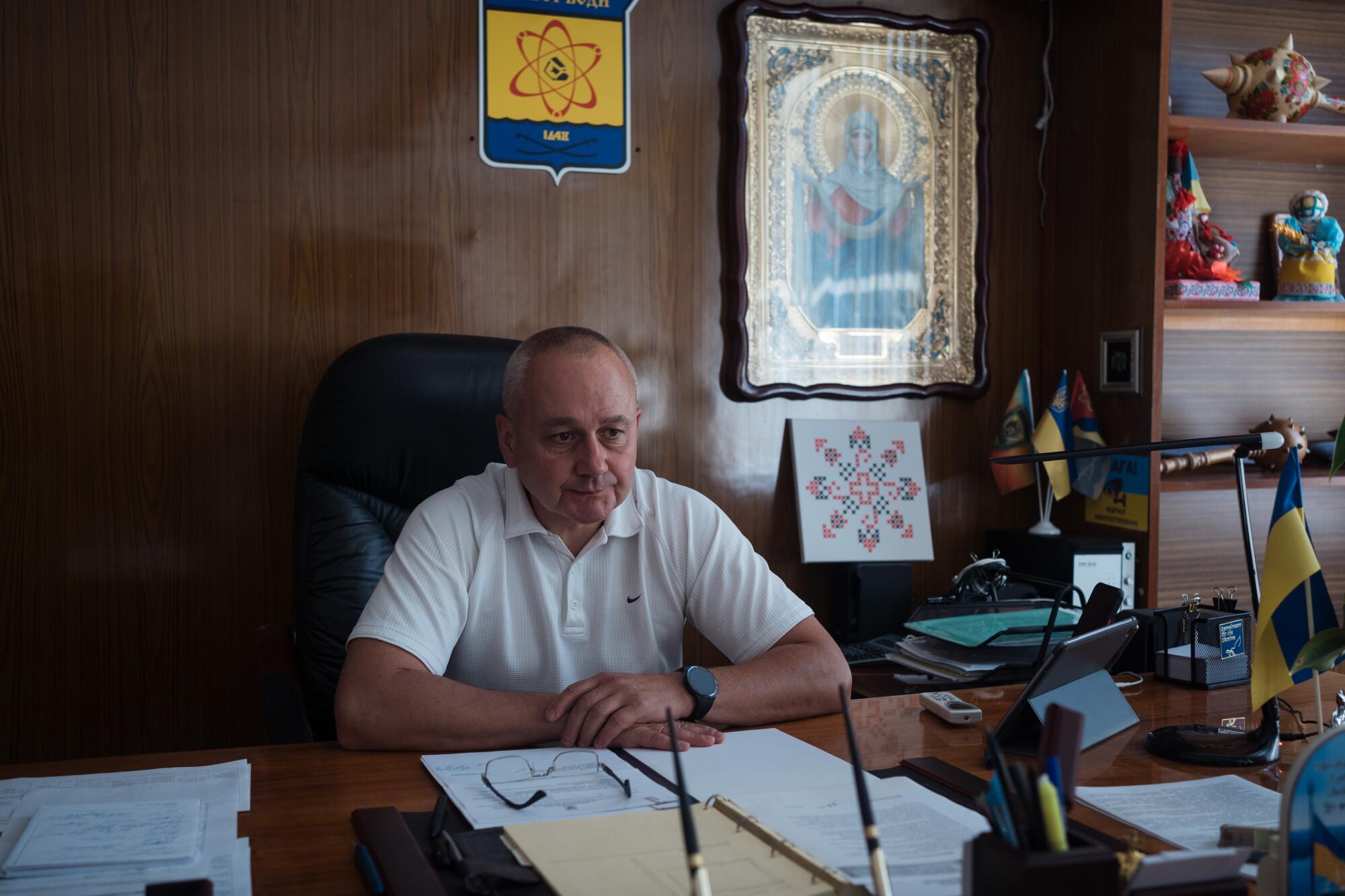
“These people have nowhere else to go,” Khanis said. “Their homes, cities are completely destroyed.”
Given all that, some residents said debating the name of the museum is a waste of time.
“I think we have more important things to worry about right now,” said Tatiana Lvova, a tour guide at the museum for the last 20 years. “We need to win the war first.”
Ayres is a special correspondent. Special correspondent Tatiana Pototska in Zhovti Vody contributed to this report.
More to Read
Sign up for Essential California
The most important California stories and recommendations in your inbox every morning.
You may occasionally receive promotional content from the Los Angeles Times.
